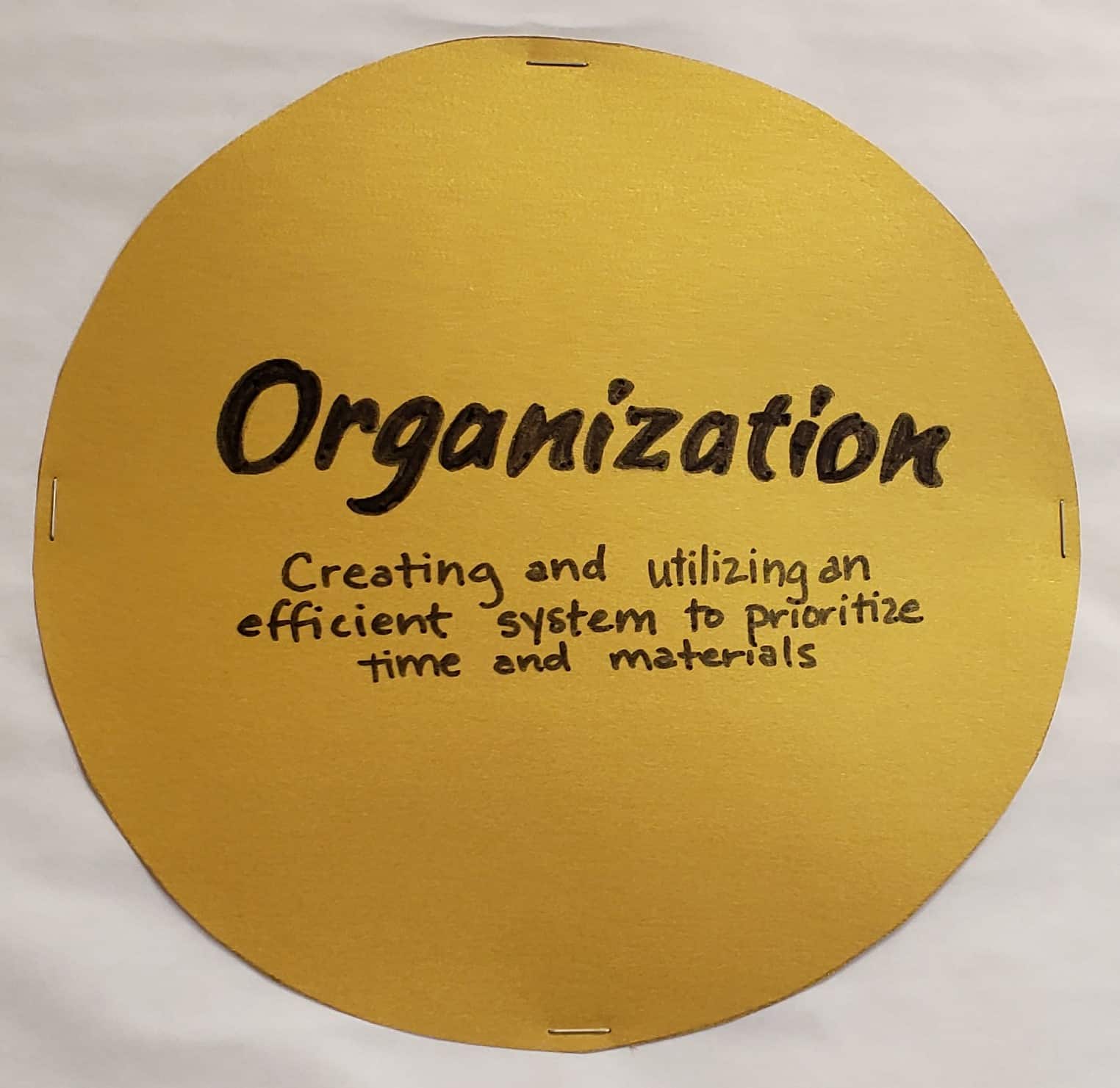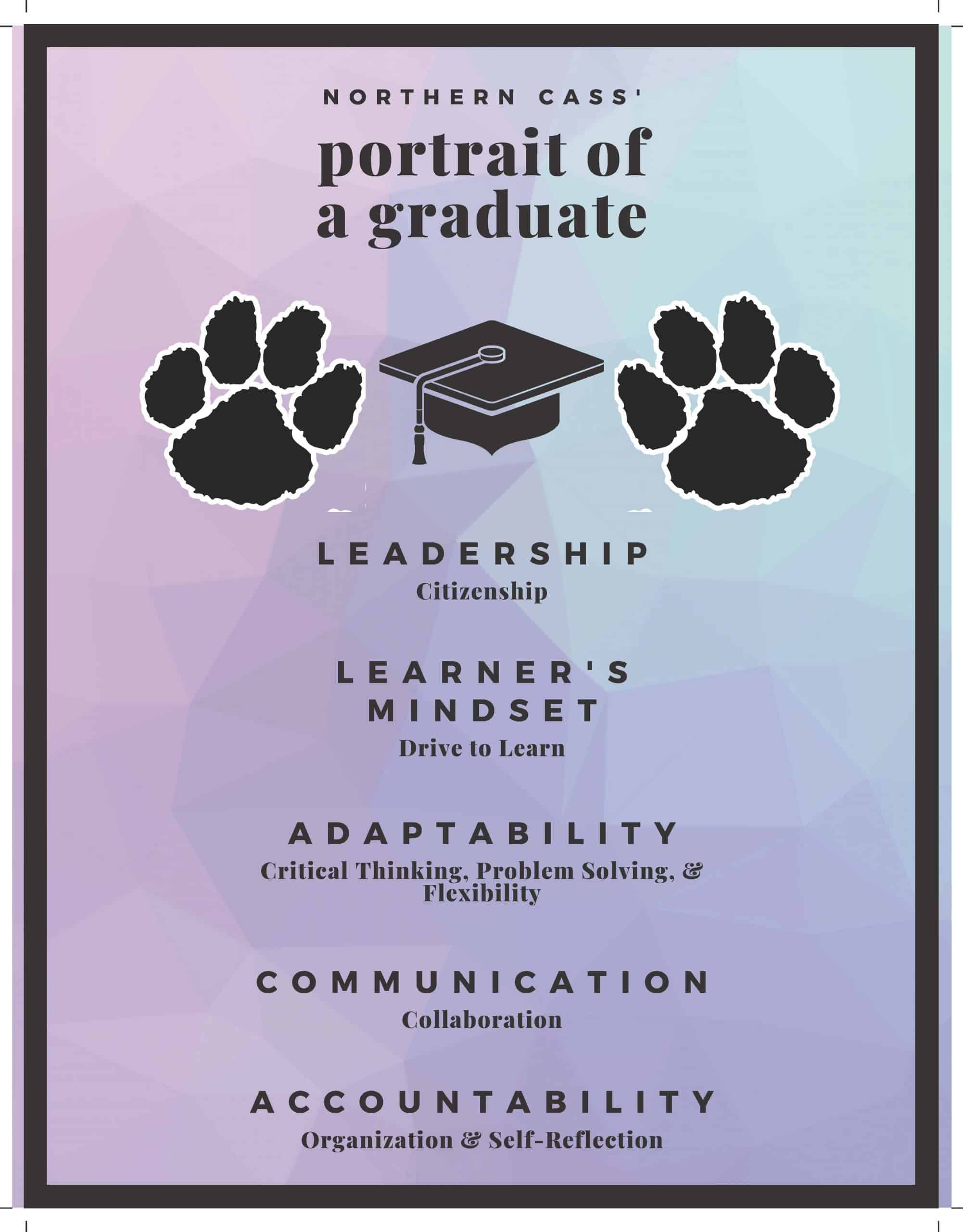Framing Habits of Work and Capstone Skills in Northern Cass
CompetencyWorks Blog
 This is the second post in a series about the Northern Cass School District. Links to the other posts are at the end of this article.
This is the second post in a series about the Northern Cass School District. Links to the other posts are at the end of this article.
Many competency-based schools are working hard to support the development of “personal success skills” or “habits of work.” These skills are well-understood to be essential for life success but are underemphasized in schools. There is no standard approach across schools in terms of which skills are emphasized, what they’re called, or whether and how they’re assessed. That’s understandable, because evidence to guide those decisions is still in early stages of development. One way to build the evidence base and improve practice is to share examples of what different schools are doing and the issues they’re grappling with.
Habits of Work and Capstone Skills
During my visit to the Northern Cass School District, I learned about their strategies with what they call “Habits of Work” and “Capstone Skills.” An elementary teacher told me that grades K, 1, and 2 teachers had developed the following habits of work list, which was posted for students:
- Effort – Always do your best. Check your work and find ways to improve.
- Timeliness – Arrive to class on time. Use time appropriately.
- Respect – Respect self, others, and property. Follow directions/classroom rules.
- Preparedness – Have items needed for learning. Complete classwork on time.
- Engagement – Practice active listening. Participate.
The high school was using a similar list, minus the first element (effort). Teachers at all levels said that developing the Habits of Work was still a work in progress. My visit was last school year. The district’s Learner Handbook for the current school year makes it clear that the district has further refined the list to include just three of the elements from last year’s list: respect, engagement, and preparedness.
I’m presenting this evolution rather than just the final list to highlight how each district will likely need to develop and refine their habits of work list over time. The habits chosen have important implications for what teachers will emphasize, what students will consider important, and how habits of work relate to assessment and accountability—more on that a little later.
Northern Cass also has a set of “capstone skills” that students must develop over time. Students do a capstone project for graduation, and their final presentation is organized in part around evidence of these skills. The capstone skills and their definitions are:
- Organization – Creating and utilizing an efficient system to prioritize time and materials.
- Leadership – Develops abilities in themselves and others in order to make a positive impact at school or in the larger community.
- Collaboration – Working towards a common goal with a group of peers while demonstrating respectful interpersonal skills.
- Accountability – Being responsible for the consequences, both positive and negative, of one’s actions; following through on obligations and commitments.
- Self-reflection – Processing experiences as a means to deepen, enhance, value, and grow their learning and thinking skills.
- Critical Thinking – Using a process to solve and reason through complex problems in a logical way.
- Communication – Effectively convey messages both orally and in written form.
- Learner’s Mindset – A belief that skills and talents are not inherited but are developed by adapting through adversity, flexilibility, and maintaining forward progress.
Each of the capstone skills is part of the Northern Cass Portrait of a Graduate, shown below. Two teachers mentioned that there is some overlap between the habits of work and the capstone skills, and there have been discussions about possibly combining them to manage complexity and streamline assessment.
 Assessment and Accountability
Assessment and Accountability
Schools that emphasize habits of work, capstone skills, and similar dimensions of student learning inevitably confront the question of whether and how to assess them and report on progress. These discussions raise many challenging questions: What do respect, engagement, preparedness, and so on look like? Should we assign competency levels? Are certain levels of performance required for promotion or graduation? Should these assessments appear on college transcripts?
A small number of districts have been grappling with these issues for years, but no consensus has emerged, so it’s valuable to look at many districts’ journeys and decisions. My visit to Northern Cass was during their first year of trying to assess habits of work, and different assessment approaches were still evolving. Several teachers felt that neither the teachers nor the students had a clear enough understanding of how to define and assess each habit of work. As a result, habits of work grades weren’t included on report cards, and teachers were looking forward to anticipated efforts to refine the system for the 2019-20 school year.
The 2019-20 student handbooks do provide much clearer guidance about what will be assessed and how. The handbook for grades 5–12 says,
“All learners will be assessed on Habits of Work. The three components of Habits of Work are Respect, Engaged, and Preparedness (REP). Learners will be assessed by their educators on a regular basis. Parents and learners (5th-12th) can access a weekly progress report located in Empower [the Northern Cass learning management system]. Habits of Work will start new every nine weeks (secondary).”
Developing a clearer system was required in part because district policies tie Habits of Work to eligibility to participate in extracurricular activities:
“An eligibility report will be run every week to get results of learner progress and Habits of Work in all classes. Any learner with a Habits of Work grade below 2.5 (in any of the three areas) OR behind pace (as set by the educator) in two or more classes will be ineligible until they meet the requirements set forth by the policy. Eligibility will run from Monday to the following Monday. All information for eligibility is collected the previous Friday. If a learner is ineligible at the end of a 9-week grading period, they will remain ineligible for 2 weeks of the next grading period. This also includes online and/or independent courses. Each learner will receive a Habits of Work grade in the above areas. A ‘4’ is exceeding expectations, a ‘3’ is meeting expectations, a ‘2’ is occasionally meeting expectations, and ‘1’ is rarely meeting expectations.”
It will be interesting to hear from Northern Cass about positive outcomes and challenges of this policy, and any further evolution of the policy based on early implementation. One can imagine the Fridays and Mondays in the school policy affecting whether or not a student can play in a championship game or attend the senior prom.
Northern Cass teachers told me that the district was developing clearer rubrics for habits of work, with valuable input from students. They were also planning in-depth work with students early in the school year to build a common understanding of what respect, engagement, and preparedness look like. At the student panel I attended, the students agreed with the importance of habits of work and were eager to participate in the more refined system as it developed.
Although it’s not the focus of this blog post, student “pace (as set by the educator)” is also tied to eligibility in the policy above. I look forward to discussing with Northern Cass how they have defined pacing requirements, and also how the “as set by the educator” part plays out. While varied pacing is a key part of competency-based education, schools still need to have expectations about pace. (A CompetencyWorks post by former Sanborn Regional High School principal Brian Stack discusses important strategies on this topic.)
These nuances go to the heart of the complex choices schools need to make as they explore how to resolve differences between traditional and competency-based principles. As we seek to implement competency-based education at scale, we need to acknowledge the choice points and share lessons learned from implementation. If we believe that promoting habits of work and lifelong learning skills is essential—and we do—we need to reckon with the complexities.
We also need to hear from more schools about their local journeys and decisions—please feel free to share your stories in the Comments section below or email them to me. What are your habits of work? What do you assess? What goes on report cards? What do you share with colleges, and what have they told you about how they use the information? What else is important on this topic?
Learn More
- The Evolution of Competency-Based Transformation in Northern Cass
- Habits of Mind and Learning New Ways of Learning at Journey Elementary
- Promoting Lifelong Learning Skills in the Classroom: New Hampshire’s Work Study Practices
- Eastern Carver’s Framework for Lifelong Learning Skills
Eliot Levine is the Aurora Institute’s Research Director and leads CompetencyWorks.